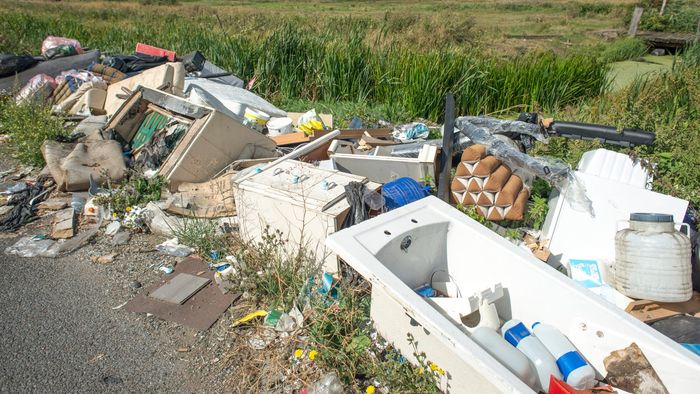KNOW THE RULES: Homeowners could face legal responsibility if their rubbish is dumped illegally, even if they paid someone else to take it away (Image: Corbis RF Stills/ Getty)
Households are being warned to check one vital document before paying anyone to take away their rubbish – or risk fines of up to £1,000. Kingdom Local Authority Support (LAS), which works with councils across the UK to tackle littering and fly-tipping, has reminded residents to always ask for a ‘waste transfer note’ when hiring someone to collect or dispose of rubbish.
A waste transfer note is a legal document proving that your rubbish has been handed over to a registered waste carrier. It comes in four parts and should be provided when a waste transfer is completed.
This paperwork is crucial if your rubbish is ever discovered fly-tipped, as it serves as proof you disposed of it responsibly. Without it, you could be held legally liable – even if you paid someone else to take it away. Examples of what a waste transfer note looks like can be found on Gov.uk.
READ MORERise in illegal dumping
Fly-tipping remains a major problem in the UK, with local authorities recording 1.15 million incidents in 2023/24, according to official figures. John Roberts, chief services officer at Kingdom LAS, said the number of cases typically rises after summer.
“In September, we see more waste being dumped, often from false waste collection teams – known as the ‘man in a van’ – who charge to collect rubbish and then dump it somewhere illegally,” Roberts explained. He cautioned that residents hiring unverified collectors, particularly those who advertise on social media, are at the greatest risk.
How to protect yourself
“The main consideration for households is to make sure the person collecting your waste can provide a waste transfer note,” Roberts said. “This document legally transfers responsibility for the waste to the person or company collecting it. Without it, you could be fined if the waste is fly-tipped.”
Legitimate waste carriers will also provide an invoice, bill or receipt confirming that payment and collection have taken place – records that can further protect homeowners if problems arise. “If you don’t have the paperwork, the blame – and the fine – could land on you,” warned Roberts.
Businesses are legally required to obtain a waste transfer note every time they dispose of waste and must keep records for at least two years. Failure to comply can result in prosecution or substantial fines.
Penalties on the rise
The maximum fine for fly-tipping was increased from £400 to £1,000 last year, reflecting growing public frustration over the scale of illegal dumping. Environmental officers say the message is clear:
- Always check a collector’s waste carrier licence (you can verify it on the Environment Agency website).
- Ask for a waste transfer note before any rubbish is removed.
- Keep all documentation in case your waste is later traced.
READ NEXT
